ATX Television Festival: Saturday Diary
ATX Day 3 and 4 were absolutely loaded, and we were there for all of it. There's a lot to get to today, almost 5000 words worth, so let's jump right in and dispense with the usual pleasantries. Enjoy!
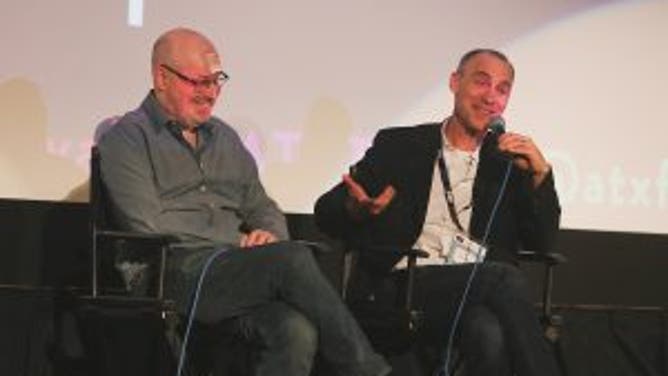
THE AMERICANS
Here's what we didn't learn about The Americans from showrunners and co-creators Joe Weisberg and Joel Fields during their ATX panel on Saturday morning: Anything about Season 6.
Both were careful not to give anything away about the final season, which will premiere in 2018. The closest we got to an answer was the acknowledgement that there's a lot to tie up in just ten episodes, so "a lot of things will be happening." That's about all we could expect anyway, as the secrets and the fate of Philip, Elizabeth, Stan, and maybe even the Mail Robot still hang in the balance.
Joe and Joel understand the criticism from fans and those that cover the show respective to the relative slow pace of the fifth season. It wasn't by design, but each season of The Americans, according to Fields, is supposed to feel different. There was so much action and so many big moments in Season 4 that simply couldn't be done again, so the plan was to focus on the people, the emotions, and the Jennings family as a unit. It was about the "psychology of the characters," as well as their backstories and what drives their actions.
The final scene of the season was one that existed to show growth. Weisberg said it was largely about illustrating how far both Philip and Elizabeth have come over the course of the last five years. These two have gone from operatives to friends to lovers to legitimately married, and they've also evolved as parents that want the best for Paige and Henry. Their hesitation on orders from the Center, and their willingness to speak up to the likes of Gabriel and Claudia are things we wouldn't have seen three years ago.
Why Est? Sometimes, things take on lives of their own. Originally, Joel Fields said the idea of Est came about because the writers wanted to give Sandra Beeman something more to do. Then, they decided to have Stan attend, and eventually it got to Philip. After researching the techniques and the seminars, they realized the philosophies could help to flesh Philip out and add another layer of vulnerability and emotional resonance. The viewers could latch onto him in a way they couldn't before. They also made sure not to treat Est in a "negative or snobby" way, subverting the manner in which things like it are often portrayed in entertainment.
Joe Weisberg pointed out how often he's had to defend Elizabeth as a character. The words "cold" and emotionless used to be the norm, but Weisberg always fights against those comments, explaining why she is who she is and also describing how much she's changed along with her husband as time has passed.
Do they read reviews? Fields says he ends up going down the rabbit hole quite frequently, and especially in the first year, those comments often led to major discussions in the writing room. Weisberg tells himself every week he'll go to sleep and then read the recaps and think pieces the next morning, and invariably ends up awake at 12:30 absorbing every word. Fields joked that often the more essay-style reviews (of which I hope mine qualify) are deeper and more interesting than the episodes themselves.
How will it end? Joe Weisberg and Joel Fields mentioned The Sopranos, Mad Men, and NYPD Blue as shows that had finales they loved. Weisberg was a huge Blue fan, and loved how Sipowicz ended up in control. As far as The Americans goes, Fields put it in very plain terms. "We just try to follow this story. The goal is for it to be satisfying for what it wants to be." Weisberg made it clear there would be plenty happening in both the action and story world, and both like the idea of a shorter season.
Usually, the two construct the front half of the season and then work on the back half, but the final season presents a new challenge. Fields said it's almost impossible to write episodes 4-7 without knowing what's to come in 8-10. Ordinarily, they can write half and then work through the next seven episodes, but here they must know the ending for everyone to make sure all characters are placed in logical positions prior to their individual or collective exits.
One audience member asked a pretty amazing question as to whether it's possible to create a show sympathetic to ISIS. Weisberg believes it would be difficult, but might not be impossible. He saw one interview with someone with ISIS ties that explained their arguments in a way no American news outlets or sensationalists could, and he finally understood more of the motivation and the passion. He didn't seem interested in actually doing it, but Fields mentioned a new series overseas that shows everything from both an Israeli and Palestinian perspective. It's a bold idea, but it actually works.
Finally, the acting got its due. Joel Fields put it very eloquently when he said, "What we've learned is, whatever we can dream, they (the stars) will amplify in beautiful ways." One example was Keri Russell randomly, subtly scratching her leg this season. Joel couldn't figure out why she was doing it, thinking she just had an itch of some kind, but realized she was actually just following through with the story. The week before was the episode featuring all the bug bites, and Russell was ensuring everything made sense. That's incredible attention to detail, and it's also ridiculously professional.
ALIAS WRITERS REUNION
After looking at the general admission line for this panel, you have to wonder if the festival organizers wished they had put this one in a bigger theater, rather than the fairly small Trinity Hall. Ken Olin, Sarah Caplan, Andre Nemec, Josh Applebaum, and Monica Owusu-Breen all joined Entertainment Weekly's Sara Vilkomerson for an hour to discuss one of ABC's most celebrated shows of the past few decades.
Alias was all about Jennifer Garner's performance, and to a person, everyone on stage raved about her willingness to do the physical stuff, to play both the serious and the lighter moments, and to commit professionally to the role in every way. She was the show, and she took care of it as someone who knew just how important she was to every episode.
The series featured a plethora of guest stars and cameos, which Sarah Caplan says she believes were just people JJ Abrams wanted to meet and hadn't at that point. Alias was one of the first network shows to really challenge the idea of a week-to-week episodic structure and go for more of a serial idea. There was a standalone component, but the lore and the mythology behind the show is what led to no empty seats in Austin on Saturday.
The biggest discussion outside of Garner was of the pilot, which still stands as one of the better series openers we've ever seen on network television. It was long, it was detailed, it set up so many different aspects of the show that would carry forward to the end. Ken Olin said Alias was largely about a father and daughter, with the spy craft as a prism to put them in the worst of circumstances.
Josh Applebaum said when he first read the pilot script, he was blown away. He still believes it to be the best such effort he's ever seen. When he picked it up, he started reading. It was supremely long, thick pages, and had an extended introduction. But it was magic, and everyone involved with Alias has nothing bad to say about it.
Sarah Caplan worked on Felicity with Abrams before doing Alias, and as soon as she mentioned the vehicle that put Keri Russell on the map, the crowd erupted into applause. When she was asked about the end of the series, she said it came at the right time. Olin mentioned how much Garner wanted to start a family and even how they worked around her pregnancy and found a way to make it work within the show. But five seasons felt like a good number, and the series didn't outstay its welcome.
One thing Ken Olin learned as the series went along is that Bradley Cooper had a marketable, strong sense of humor. Imagine that. He could do the drama and the comedy, just like Garner, and obviously other people figured it out as well, because the guy has had a pretty decent career since Alias left the airwaves I'd say.
Michael Giacchino's score was praised as well, which isn't a surprise, as his work has been stellar for as long as I can remember caring about such things, and he's worked with Abrams on numerous projects, including Lost and Star Trek.
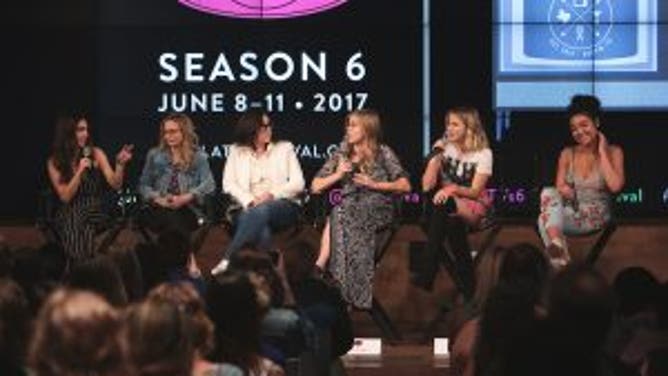
(Photo by: Waytao Shing)
SWEET VICIOUS
This was one of my most anticipated events of the entire festival, because Sweet Vicious, canceled after one strong season this spring by MTV, sparked a debate, a conversation, and offered up a set of stories we simply don't see on television.
The panel was packed, with every seat in the Google Fiber Space filled, and it began with a screening of the pilot episode. Then, Variety's Maureen Ryan welcomed stars Eliza Bennett, Taylor Dearden, and Aisha Dee, along with creator Jennifer Kaytin Robinson, executive producer Stacey Sher, and writer and producer Amanda Lasher.
Sweet Vicious tells the story of Jules, a college sorority girl who was raped, and after the event, became a Batman-style vigilante, attacking boys guilty of sexual assault who had not been punished. She meets Ophelia, a weed-smoking smart ass hacker, but one with a good heart and her own set of issues. The two superheroes cut through their town, learning more about themselves, their pasts, and their friends in the process.
This is very much an advocacy show, and every single panelist on stage shed tears at some point during the event. Originally it was a half hour spec script, but MTV told Jennifer Kaytin Robinson they thought it would play better as an hour, and asked her to dig a little further. Much of what ended up in the ten episodes was on the page, but JKR said "the cast made it their own."
Eliza Bennett, who plays Jules, says the show's biggest strength is in its ability to express what rape is like for a victim, and also what it's like to find out your stepbrother is a rapist, or your best friend. It isn't just her story, although that's the springboard to the larger plot. The show also depicted moments where the girls didn't trust one another, to which Eliza said it was particularly tough to shoot scenes where women didn't believe women.
JKR pointed out that this was an all female producing team, but the male characters were essential. She said the message was not that men were evil. "Men are human beings. It was important to have men in the writer's room. One thing she mentioned was that the show would hope to shed light on questions like "Why are men this way? Why do they just think they can take what they want?"
I cringed just a bit, as I'm a man I'm very much NOT that way, nor have I ever known someone who was, but she specified how big a problem it is on college campuses. She didn't quote the ludicrous 1 in 5 college women have been sexually assaulted statistic, which I appreciated.
Bennett broke down and cried when she revealed that because of the show, over half of her friends admitted to her they had been sexually assaulted in the past. She went on to add that every woman "has a story of clutching her keys, having her ass grabbed, cat calling" and that it makes them feel like their bodies are the only thing about them that matters.
The responses from rape survivors, as well as those without a personal experience, overwhelmed all of those on stage. "It's weird to say incredible, because it means thousands of people have told me they've been sexually assaulted, which is horrifying," Kaytin Robinson said. "But it's validation that they aren't alone, they're heard, and it happens, and it's happening, and people care about it."
They want to do more episodes. They were very upset when MTV made the decision to cancel, and they were also surprised. They asked fans to spam Netflix's request page to get the first ten episodes streaming. Currently, they're unavailable anywhere, even on MTV's webpage. The only way to get them is through Amazon, and it's not free. "Stay vocal and tweeting to the networks, because I do think those optics matter. It matters more than ratings. Staying loud and staying vocal and continuing to say you want this," is how JKR approached the question about the show's future.
She asked that fans use #SaveSweetVicious, which then trended shortly thereafter on Twitter.
Sher stated that MTV killed them off "slowly" and "not so nicely," but that the network didn't want to do what it did. They told JKR and Sher that if they could find someone to partner with them, they'd go forward with another season. Stacey said that they've now got four willing partners, so Sweet Vicious is anything but dead at this point.
Finally, Jennifer Kaytin Robinson said if she had done the show on NBC for five years, "but that it would be terrible and would sensationalize rape, I would say no, I want these ten episodes." This was by far the most emotional event I attended all weekend. There wasn't a close second. Dearden at one point reached over to hold Bennett's hand when she began to cry. The audience also teared up at various times. If you're interested in the show, you should know it's excellent.

(Photo by Michelle Maurin)
SONS OF ANARCHY DIRECTORS
Well, Kurt Sutter ended up having to cancel the day before the panel, as he's on set working on his next project, but he did Skype in for a few minutes as the event got started. Adam Arkin and Paris Barclay were there, and they were fascinating. Sons of Anarchy spanned seven seasons and resulted in some of the more memorable deaths in cable television history. Barclay directed more episodes of Sons than anyone else, and he and Sutter first became acquainted as both worked on The Shield.
Barclay is quite the character, which makes him a perfect panelist. He's candid, crass, open, and even said a few things that stunned me a bit. He's a liberal man, and at one point he said this: "In entertainment, shouldn't we try to find out how to tell stories that we lefties, we liberals in Hollywood believe in?" Wow. That's plain as day. Personally, I thought that's what we've watched for the last five decades, but he's an activist. He's also honest, which I appreciate.
Much of the talk was about the leadership and professionalism of Charlie Hunnam, who played Jax Teller. He forced the rest of the cast to step their games up, as he would show up for table reads in character, already fully understanding every word of the script, and ready to shoot. Barclay said it's incredibly rare for a drama series to do frequent table reads, but on Sons of Anarchy, every single episode had its own read.
When Hunnam argued with one of the writers, according to Barclay, "he was almost always right." He had the respect of the cast, who saw him as a leader, and he had the ultimate respect of the entire crew. He led the way, and helped create the brotherhood of the cast. Arkin said the emotional scenes, the ones with the hugs and the tears, those were the easiest to shoot, because it was the legitimate vibe of the cast. "If anything, you had to sort of tone some of that stuff down."
He also said Charlie Hunnam was not physically shy, and treated sex scenes like choreography. Paris added that those scenes were a lot of fun, because Charlie was so involved and willing to just show his naked ass whenever and wherever necessary.
Adam Arkin was an actor turned director, and played roles on Sons of Anarchy, as well as Justified. For Sons, as a director, he said he had to "learn not to be intimidated, because there were layers about that show that could be incredibly intimidating. At a certain point, I realized if I wanted to do the job I was hired to do, I couldn't give in to that."
Both Arkin and Barclay talked of the family atmosphere that existed with the cast. Paris put it beautifully when he described it thusly: "Something happened on Sons of Anarchy, and it happened maybe in Season 1 and maybe in Season 2, where Charlie Hunnam became the leader of a motorcycle gang, that just happened to be actors." These guys would show up in leather, they'd be off screen wearing the gear. When Theo Rossi, who played Juice on the show, was on the outs with the club, he would physically sit in a different seat during the table reads, alienated from the group.
That's insane, but it's also fucking awesome.
Adam Arkin directed the episode where fan favorite, Opie, was murdered. "I was really honored that I was given that opportunity. It was going to be a seminal moment, and the way it was executed in terms of the script was beautifully done. I knew it was going to be a traumatic ride for a lot of folks." It was, as the cast was an emotional wreck after Ryan Hurst departed the series in such a brutal on-screen way. Similarly, Paris Barclay said when Gemma Teller (Sutter's wife Katey Sagal) was killed by her son in the final season, it nearly broke him in half.
The music of Sons of Anarchy was one of the things I've always pointed to as all-time great. How was it done? Kurt Sutter loves music, and he loves what it can mean to a scene when it's timed right and fits the story. "He's a music maven," said Barclay. "His wife happens to be a musician. She, you know, has some talent. He just has the tone of what he wants the show to be. He wants to ride this line, sometimes it's funny, sometimes it's dark, but it's driven by the music."
Finally, Walton Goggins received massive praise from Arkin and Barclay for his work as transgender escort, Venus Van Dam. Barclay recounted an email sent from FX president John Landgraf, who was blown away by one particularly memorable scene featuring Venus and Tig Trager (Kim Coates). He couldn't believe Sons of Anarchy could work something so special into its world. As for Goggins, Arkin said the truly astonishing thing was Walton playing the character "without comment."
It wasn't mockery, it was never light, it was exactly like this person would have existed. "He found a sort of bottomless well of compassion for the person he was playing, and you sort of automatically cared for her."
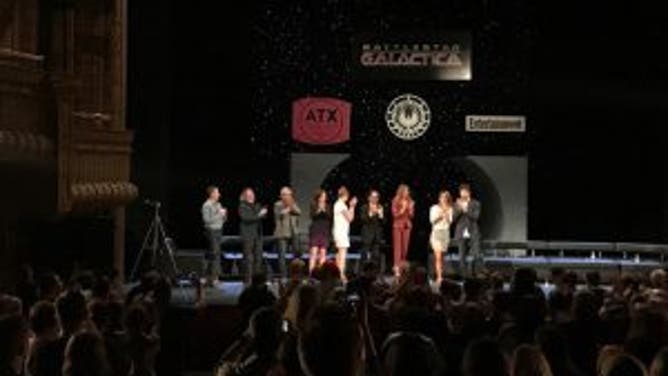
BATTLESTAR GALACTICA REUNION
This was the last "big" event of the festival, though there were more panels the next day. This was the closing ceremony, so to speak, with a red carpet and paparazzi everywhere, including me. Last year's Saturday night spectacular was the Ugly Betty Reunion, which was really good and showed a group of people that were and are very close.
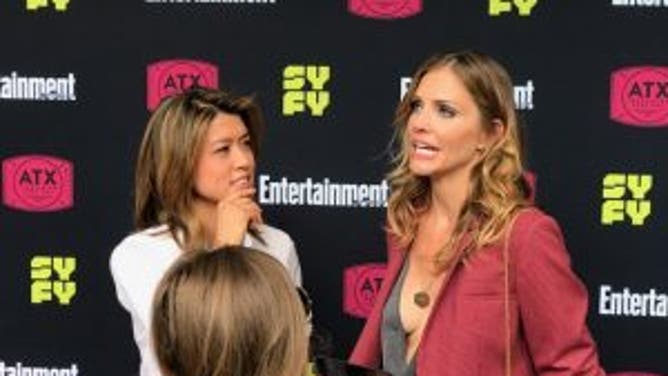
But I think BSG topped them. These individuals love each other, and watching them cracking jokes to one another and telling all sorts of interesting stories, from how they were cast to how they were almost fired to how much they believed in Ronald D. Moore's writing. Just about everyone that mattered was there, as along with Moore were stars Edward James Olmos, Mary McDonnell, Katee Sackhoff, Tricia Helfer, Grace Park, Michael Trucco, and the life of the party, James Callis, who was uproariously entertaining all night long.
Via Skype was a surprise appearance from Jamie Bamber, who played Lee Adama on the series. Unfortunately, the technology was anything but seamless, and after delays and some awkward back-and-forth attempts to converse, the festival organizers decided to pull the plug. But he was there, and it actually played well because these people are so engaging.
Katee Sackhoff hadn't been acting for very long, yet somehow she was cast as Starbuck. That character was a male in the previous iteration of the series, and it raised the ire of fans that care about that sort of thing. She said she went to an internet cafe (when those existed) and found a chat room. They were annihilating the decision to cast her, even though they'd never actually seen her perform in the role. "I learned in that moment...fuck 'em."
She didn't know it was a male character until she told her father she was going to be Starbuck and he told her to go to Blockbuster, rent the old series, and see what she thought. "Oh shit," was her reaction once she followed his advice.
She was told numerous times she wasn't right for the part, that she was "too girly" for the role, and said she had to fight her own mind and its propensity to buy into the criticisms.
Edward James Olmos and Mary McDonnell were well-known and well-respected long before they boarded the Galactica, and both said they weren't initially interested in the series. The name was a problem, as it connotes something less than prestige, but once they saw the script and met with Moore, they both decided to do it. Each then basically said it was the best decision they ever made, and Olmos said he'll never have another experience like it, and he's lucky he even had one.
Tricia Helfer, who played Cylon 6, had been acting for about a year. When she got the gig, she was scared. She had to do intimate scene work with James Callis, and she said she was very shy. That's interesting, because on screen, she was arguably the sexiest woman on television, and came across anything but reticent. She was sure she'd be fired, and decided she and Callis should kiss on their own to break the tension. She took him to the basement and they did it, and it loosened them up.
Callis just leaned back on the sofa as she spoke, making it obvious he was very okay with their "preparation." He was the star of a stellar night. This was just a terrific event. Everybody brought something interesting to the discussion.
Michael Trucco said it was the best script he'd ever read, and he was dying to do the show. He wasn't selected originally, and his Anders character was only supposed to be around for two episodes as part of a Starbuck love triangle in Season 2. It ended up being much more than that, and he said he was embraced by everyone in the cast from the first day, and made it clear just how thankful he was for how they treated him.
One thing that resonated throughout this panel was how happy all these people were to be a part of the reunion, and to be alumni of Battlestar Galactica. SyFy gave that show a platform that it repaid in spades. All the stories told during the 90 minutes were wonderful, but the panel ended in the only way it could. Edward James Olmos was handed the microphone, and he led the entire room in a "So Say We All" chant.
Incidentally, it was the "So Say We All" scene from the four hour pilot that galvanized the cast. They had been shooting quite a bit that morning, broke for lunch, came back, and that was the very first thing they went to after the break.
Captain Adama's speech, with Olmos adding in more inflection with each "So Say We All" rallied the cast, who for a moment forgot they were acting on a television show. From that point on, it was a different show, a different job, and a different group of people. Oh, and it was number nine in my Outkick top ten three years ago. That piece is available here, should you choose to read it.
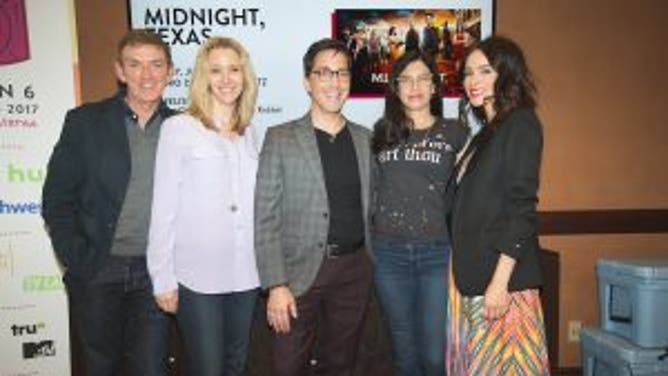
(Photo by: Tammy Perez)
THE COMEBACK
This was the first Friends cast member with whom I've shared a room, but Lisa Kudrow is much more than one show. She was a Groundling, an Improv superstar, and a wickedly smart woman. When she and Michael Patrick King (you probably know him better for Sex and the City, and sadly for 2 Broke Girls) created The Comeback for HBO, their only sin was being ahead of their time. Widely regarded as one of the best comedies of the century, it was cringe-inducing in a Curb Your Enthusiasm or early Michael Scott kind of way, but it was also insanely well-executed.
The final panel of the festival featured Kudrow, MPK, writer and co-star Dan Bucatinsky (Scandal, 24 Legacy), and Laura Silverman, who played Jane Benson.
The conversation started on a somber note. There was originally to be a fifth person on the stage. Robert Michael Morris, who played Mickey Deane, called Michael Patrick King on Monday from a hospital bed and said he wasn't sure he would make it to Austin. The next day, he lost a long battle with cancer. He was 77 years old, and at one point during the first season of the show, he was sick. He has dealt with stage four cancer for many years, and it was tough for those in the room to talk about what a great friend and colleague he was.
It was an emotional way to begin, and when the clip was shown of the series finale, where Mickey had been rushed to a hospital and Valerie decided something was more important to her than being on camera, Lisa and King both mentioned the unfortunate similarities to real life.
There's so much to say about the series, but the most shocking thing is it was cancelled after one 13 episode season in 2005, and then was brought back in 2014 for another run. And yes, if HBO comes to them again and wants more, they're willing. They're proud of this series, but more than anything else, they loved making it and enjoy working with one another.
Valerie Cherish is right up there with Ricky Gervais' David Brent in terms of her unlikable nature, and interestingly, Michael Patrick King said the script always made sure to put all the blame on her for her mistakes. She wasn't treated unfairly. She slipped on the banana peel. She was the jerk, no matter what. Though the revived finale would show her in a different light in its last few minutes, she was never supposed to be the protagonist. Eventually, we began to like her, but it wasn't for the genuine reasons.
Lisa Kudrow was masterful on the show, and listening to MPK and Bucatinsky talk about how hard she worked and how much of herself she put into the character she developed and created was impressive. Also, none of these people have forgotten anything about this show. It's as if they just wrapped last week. Considering all they've done since, the fact that The Comeback is still so fresh in all their minds speaks to how good it was, and how memorable it was as well.
These were four people overjoyed to be sharing a stage with one another to talk about something they hold so dear in their careers and lives. Super fan and Timeless and Rectify star Abigail Spencer moderated the panel, and I physically watched multiple festival personnel attempting to get her to end the event, as the time was up. She asked more questions, and not one of the panel members seemed in any hurry to end the discussion. The Comeback still exists on HBOGO, and it's one of those shows everyone should absolutely watch. Hearing them recount the high points immediately made me want to jump back into it.
And THAT was the ATX Television Festival for 2017. My thanks to the festival for the invite and the hospitality. I look forward to Season 7 in 2018. It's a great time. If you love TV, you should consider attending yourself. One more piece of business is my roundtable interview with Alison Brie, Betty Gilpin, and Liz Flahive of Netflix's new comedy, GLOW. You'll hear that next week on Outkick the Culture. You'll also read my full review of the first season of GLOW next week as well. Spoiler alert: It's really good.
I'm @JMartOutkick. I'm also a great time.